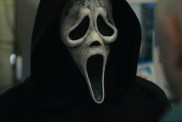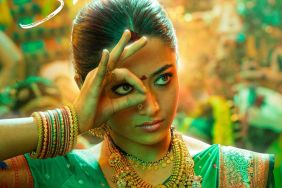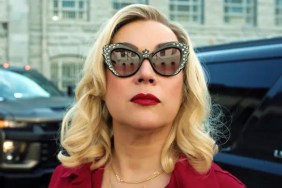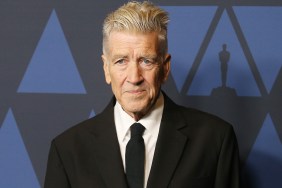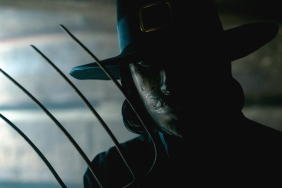
Ben Stiller’s high fashion/low IQ model Derek Zoolander is back on the big screen after nearly 15 years this weekend with the release of Zoolander 2. Although the original Zoolander only performed moderately at the box office in 2001, it has slowly developed a rabid following over the years, and so director/co-writer Stiller was able to lure his original co-stars Owen Wilson and Will Ferrell back, along with a host of other famous cameos.
Another famous member from Stiller’s roster of compatriots that came back is Justin Theroux, who played the Evil DJ in the first movie and also co-wrote Tropic Thunder. Theroux is back as the DJ as well as co-writing the screenplay with prolific comedy scribe Nicholas Stoller (The Muppets, Get Him to the Greek, Neighbors 2: Sorority Rising). Along with John Hamburg and Stiller, Theroux and Stoller worked on the screenplay for Zoolander 2 off-and-on for years, and Theroux almost directed the sequel until his commitments to HBO’s “The Leftovers” interfered.
We had the chance to talk 1-on-1 with Stoller and Theroux about their work on Zoolander 2, as well as Theroux’s time writing Iron Man 2 for Marvel.
ComingSoon.net: There are comedy sequels like “Hangover 2” or “Neighbors 2” where the studio was obviously like, “We want another one of these five minutes ago. We want part two right now.” And then there are the ones like “Anchorman 2” where it feels like the talent is really the one pushing that through. Where does “Zoolander 2” fall on that pie chart?
Theroux: They wanted it right away and we gave it to them right away.
Stoller: Yeah.
Stoller: It was filmed 10 years ago.
Theroux: Well, we shot this 11 or 12 years ago.
Stoller: It was 14 years ago, and they put it on the shelf.

Stoller: It had problems. You saw it.
Theroux: And then we re-shot the whole movie 15 years later. We did reshoots.
Stoller: There was an extended lawsuit and Ben was like, “Yeah, release it.” And so, it’s been released. But yeah, it was made 15 years ago. It was made before the first “Zoolander.”
Theroux: It was actually the first one.
Stoller: The first “Zoolander” was a reboot of this “Zoolander.”
CS: (laughs) But among the cast there was a genuine feeling of, “We really want to do this,” right?
Theroux: Yes.
Stoller: Yeah.
Theroux: Everyone’s careers were in much different places when the first one was made, so part of it was honestly just the fact of just making sure that we could get everyone’s schedules and get the stars to align, like, literally. So and that’s part of it. And the other thing was not wanting to just jam something and make it be something that just didn’t seem to do anything.
CS: Nick, you have a very straightforward directing style when you make a film, but when Ben directs there’s always this unusually high level of intensity for a comedy. Intensity to the performances, crazy camera angles, the level of detail, everything. Can you talk a little bit about Ben’s intensity?
Stoller: Actually, I like the euphemism of “straightforward.” (Laughs) You mean mediocre?
CS: No, no!
Stoller: Yeah, I mean, I think he’s an incredible director and he has a kind of a real style. There’s also in this, you know, the first one was obviously like a “Manchurian Candidate” and this is “Da Vinci Code,” and he’s kind of taking a lot of stylistic cues. He’s a real cinephile and he’s taking a lot of stylistic cues from those movies or from the genres that gave birth to those movies. And so, I think that allows for heightened camera angles and the kind of tone of the movie demands that. The crazy thing about this movie is how beautiful it looks, in addition to being really funny.
Theroux: Yeah.
Stoller: Doesn’t care so much about comedy or…
Theroux: You can pull the jokes out of this movie and it’s a pretty good action movie.
Stoller: Yeah.
Theroux: In a weird way.
Stoller: Yeah, it’s crazy, you know? And I think there has been a real push among all comedy directors to make their stuff look good and not make it look like a sitcom, myself included. Comedy is my favorite genre. I think it often doesn’t get the respect it deserves, and I think one of the reasons is there was a tradition in the past of comedy looking kind of brightly lit and like a sitcom.

Stoller: Yeah, like Walmart, exactly. I think in the ’90s a lot of comedies were like that. Like, a big thing I do now on the movies I direct is I turn off all the lights in the house because you don’t have every light on in your house when you’re hanging out at home. It’s just not the way it works. So that’s a debate I have with the—actually, the DP I work with now completely understands that, but that’s like, a small example.
CS: Brandon Trost, right?
Stoller: It’s Trost, exactly. The movies I do are much more kind of natural, a more grounded world. It takes place in the normal world. So if I did a lot of heightened camera angles, that would be strange, but I think that it’s a similar thing that Ben’s trying to do, which is just make a movie that looks awesome, because then it makes everything funnier and makes the movie going experience more exciting, which it should be.
CS: There were a ton of pop culture references in the first movie, but it’s still a very beloved thing. How do you sort of track which jokes you want in there? “Is an Uber joke still going to be funny two years from now?” That kind of thing.
Theroux: I don’t know. I mean, because it’s an Uber joke, but the joke is not really that far away. But I think you just kind of have to have faith that something will remain funny if it’s setup right, you know? Certain jokes will of course stay, like little—but there’s stuff in the first one that still plays.
Stoller: I actually just pitched 200 Lyft jokes and they didn’t want to do it. I don’t know why. But basically, I brought in a line that was a riff on Lyft. (Laughs) We looked at their business plans to see which one was more viable.
Theroux: There was almost a Seamless joke.
CS: And in the same regard you have Kyle Mooney’s character as sort of this prototypical hipster tastemaker, and everything from 15 minutes ago is a joke to him.
Theroux: Yes. He goes through pop culture references way too quickly.
CS: When I saw your name on this and “Neighbors 2” and “Storks” it made me wonder, “Does Nicholas Stoller write every studio comedy now?” You have this insane dance card, how do you juggle a lot of projects and still sprinkle the appropriate amount of magic pixie dust on all of them?
Stoller: Well, I kind of follow the Ron Bass model, I hire a group of interns. (laughs) No, I mean, this was a group. The first draft that I worked on of this with Ben was like over 10 years ago. And then, it was honestly on and off. There were years when Justin was writing it and there were years where Ben and John Hamburg were writing it, and Ben was always the kind of constant. But it wasn’t like I just wrote it, you know what I mean? It happens to be a year where like, things that I’ve worked on are coming out at the same time, but that’s more just timing than anything else. This has been a long gestational period for all four of us, I would say.
CS: Of course.
Stoller: Yeah, but I’ve been very lucky and I’ve gotten to work with a lot of cool, really awesome comedians, and I’ve felt very lucky in that in my career.

Theroux: I don’t know. I think they did something brilliant with their universe. You know, Kevin Feige and Jeremy Latcham and all those guys have probably been some of the biggest fans of their characters, so they take very good care of all their characters. But with “The Avengers” and everything, they kind of made “Star Wars” in reverse. It was an incredible feat, what they did there. But as far as being part of the process, it’s just cool to work with them because they know their universes so well, and they deserve all the stuff that comes to them because they really have sort of tapped on a huge—people give superhero movies grief, but I think they’ve contributed an enormous amount to fans like me, who like to go see those movies.
CS: Absolutely. But in that movie specifically you were setting up “Black Widow” and “Avengers” and, to a very small extent, “Black Panther.” What do you think has changed along the process, from what they were envisioning at that point?
Theroux: I don’t know. I mean, part of this is by design by Marvel and part of it’s a bit of an exquisite corpse. Everyone gets to sort of write on things and be a part of things, so I don’t know if Scarlett knew what she’s in for. I can’t imagine she would’ve, but I don’t know, part of it, maybe 10 percent of it they’re kind of discovering as they go. I can’t help but think 90 percent of it is completely by design. You know, they know. And again, that was one of the fun parts to that process was literally sitting down with Favreau and Downey and Feige and Latcham and actually going like, “Who’s going to be the baddy? And are there other characters we want to plant in this movie?” And that was definitely a discussion we had on the table.
Paramount Pictures will release Zoolander 2 in theaters on Friday.
(Photo Credit: WENN.com)
Zoolander 2
-
Zoolander 2

-
Zoolander 2

-
Zoolander 2

-
Zoolander 2

-
Zoolander 2

-
Zoolander 2

-
Zoolander 2

-
Zoolander 2

-
Zoolander 2

-
Zoolander 2

-
Zoolander 2

-
Zoolander 2

-
Zoolander 2

-
Zoolander 2

-
Zoolander 2

-
Zoolander 2

-
Zoolander 2

-
Zoolander 2

-
Zoolander 2

-
Zoolander 2

-
Zoolander 2

-
Zoolander 2

-
Zoolander 2

-
Zoolander 2

-
Zoolander 2

-
Zoolander 2

PARIS, FRANCE - MARCH 10: Derek Zoolander walks the runway at the Valentino Fashion Show during Paris Fashion Week at Espace Ephemere Tuileries on March 10, 2015 in Paris, France. ZOOLANDER 2 will open in theaters in the U.S. on February 12, 2016. (Photo by Pascal Le Segretain/Getty Images For Paramount Pictures) *** Local Caption *** Derek Zoolander
-
Zoolander 2

PARIS, FRANCE - MARCH 10: Derek Zoolander walks the runway at the Valentino Fashion Show during Paris Fashion Week at Espace Ephemere Tuileries on March 10, 2015 in Paris, France. ZOOLANDER 2 will open in theaters in the U.S. on February 12, 2016. (Photo by Pascal Le Segretain/Getty Images For Paramount Pictures) *** Local Caption *** Derek Zoolander
-
Zoolander 2

PARIS, FRANCE - MARCH 10: Hansel walks the runway at the Valentino Fashion Show during Paris Fashion Week at Espace Ephemere Tuileries on March 10, 2015 in Paris, France. ZOOLANDER 2 will open in theaters in the U.S. on February 12, 2016. (Photo by Pascal Le Segretain/Getty Images For Paramount Pictures) *** Local Caption *** Hansel
-
Zoolander 2

PARIS, FRANCE - MARCH 10: Hansel walks the runway at the Valentino Fashion Show during Paris Fashion Week at Espace Ephemere Tuileries on March 10, 2015 in Paris, France. ZOOLANDER 2 will open in theaters in the U.S. on February 12, 2016. (Photo by Pascal Le Segretain/Getty Images For Paramount Pictures) *** Local Caption *** Hansel
-
Zoolander 2

PARIS, FRANCE - MARCH 10: Derek Zoolander and Hansel walk the runway at the Valentino Fashion Show during Paris Fashion Week at Espace Ephemere Tuileries on March 10, 2015 in Paris, France. ZOOLANDER 2 will open in theaters in the U.S. on February 12, 2016. (Photo by Pascal Le Segretain/Getty Images For Paramount Pictures) *** Local Caption *** Derek Zoolander; Hansel
-
Zoolander 2

PARIS, FRANCE - MARCH 10: Derek Zoolander and Hansel walk the runway at the Valentino Fashion Show during Paris Fashion Week at Espace Ephemere Tuileries on March 10, 2015 in Paris, France. ZOOLANDER 2 will open in theaters in the U.S. on February 12, 2016. (Photo by Pascal Le Segretain/Getty Images For Paramount Pictures) *** Local Caption *** Derek Zoolander; Hansel
-
Zoolander 2

PARIS, FRANCE - MARCH 10: Derek Zoolander and Hansel walk the runway at the Valentino Fashion Show during Paris Fashion Week at Espace Ephemere Tuileries on March 10, 2015 in Paris, France. ZOOLANDER 2 will open in theaters in the U.S. on February 12, 2016. (Photo by Pascal Le Segretain/Getty Images For Paramount Pictures) *** Local Caption *** Derek Zoolander; Hansel
-
Zoolander 2

PARIS, FRANCE - MARCH 10: Derek Zoolander and Hansel walk the runway at the Valentino Fashion Show during Paris Fashion Week at Espace Ephemere Tuileries on March 10, 2015 in Paris, France. ZOOLANDER 2 will open in theaters in the U.S. on February 12, 2016. (Photo by Pascal Le Segretain/Getty Images For Paramount Pictures) *** Local Caption *** Derek Zoolander; Hansel
-
Zoolander 2

PARIS, FRANCE - MARCH 10: Derek Zoolander and Hansel walk the runway at the Valentino Fashion Show during Paris Fashion Week at Espace Ephemere Tuileries on March 10, 2015 in Paris, France. ZOOLANDER 2 will open in theaters in the U.S. on February 12, 2016. (Photo by Pascal Le Segretain/Getty Images For Paramount Pictures) *** Local Caption *** Derek Zoolander; Hansel
-
Zoolander 2

PARIS, FRANCE - MARCH 10: Derek Zoolander and Hansel walk the runway at the Valentino Fashion Show during Paris Fashion Week at Espace Ephemere Tuileries on March 10, 2015 in Paris, France. ZOOLANDER 2 will open in theaters in the U.S. on February 12, 2016. (Photo by Pascal Le Segretain/Getty Images For Paramount Pictures) *** Local Caption *** Derek Zoolander; Hansel
